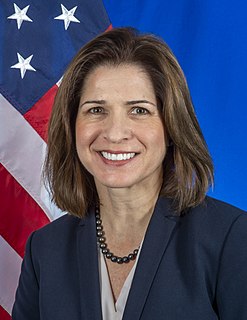| Ambassador of the United States to North Macedonia | |
|---|---|
 Seal of the United States Department of State | |
| Nominator | The President of the United States |
| Appointer | The President with Senate advice and consent |
| Inaugural holder | Christopher R. Hill |
| Formation | July 29, 1996 |
| Website | U.S. Embassy - Skopje |
The United States Ambassador to North Macedonia is the official representative of the President of the United States to the head of state of North Macedonia.
A head of state is the public persona who officially embodies a state in its unity and legitimacy. Depending on the country's form of government and separation of powers, the head of state may be a ceremonial figurehead or concurrently the head of government and more.

North Macedonia, officially the Republic of North Macedonia, is a country in the Balkan Peninsula in Southeast Europe. It is one of the successor states of Yugoslavia, from which it declared independence in September 1991 under the name Republic of Macedonia. A landlocked country, North Macedonia has borders with Kosovo to the northwest, Serbia to the northeast, Bulgaria to the east, Greece to the south, and Albania to the west. It constitutes approximately the northern third of the larger geographical region of Macedonia, and is defined primarily by mountains, valleys, and rivers. The capital and largest city, Skopje, is home to roughly a quarter of the nation's 2.06 million inhabitants. The majority of the residents are ethnic Macedonians, a South Slavic people. Albanians form a significant minority at around 25%, followed by Turks, Romani, Serbs, Bosniaks, and Aromanians.
Contents
The Ambassador, based out of Skopje, works with the rest of the embassy - 70 other Americans and 240 locals - to advance bilateral relations. [1]

Skopje is the capital and largest city of North Macedonia. It is the country's political, cultural, economic, and academic centre.
The United States established a liaison office in what was then the Republic of Macedonia in Skopje on 3 December 1993 with Victor D. Comras appointed soon after as Charge and US chief of Mission with the equivalent rank of Ambassador. The U.S. formally recognized Macedonia as an independent state on 9 February 1994. [2]









